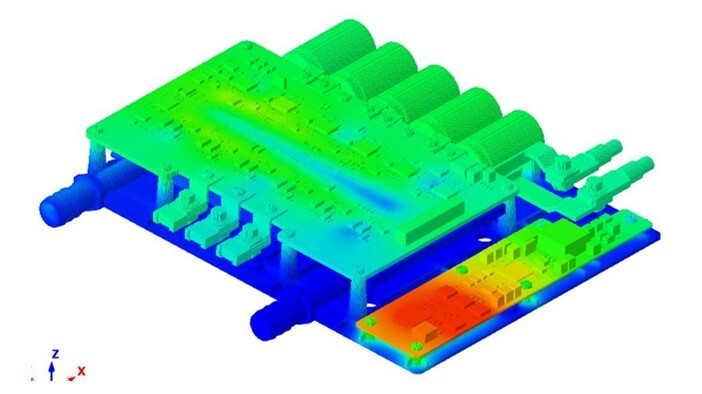Power converters must be compact and reliable for use in electric vehicles, aerospace systems, or renewable energy devices.
The traction motor also turns off powerful high-voltage modules with high power density, which cause heating due to the location of the module with an inventory in close proximity to the engine. A traction motor is an electric motor that is used to propel a vehicle (locomotive, electric vehicles, elevator). Traction motors are used in electric rail vehicles, such as elevators, conveyors and trolleybuses, as well as in vehicles with power transmission systems (diesel-electric locomotives, hybrid electric vehicles) and battery electric vehicles.
The developer of power electronics needs to take into account the heating of the power elements of the designed device, since overheating of components is one of the main causes of failures. Choosing the right component rating and the optimal size of cooling systems is a critical step in the design process. High temperature gradients in the device have an impact on the overall performance of the converter and can cause mechanical damage due to differential thermal expansion. The development engineer needs to find the right balance between reliability and performance, cost and overall dimensions.
The Altair PSIM software solution (more details) allows you to conduct a comprehensive simulation of an electric drive, including a motor, converter and control system. Virtual simulation will allow you to test various operating conditions of the electric drive and see the results. The behavior of each power module (device) can be accurately represented using special models that will help to estimate power losses depending on the heating temperature. The user can evaluate how the choice of variables affects the temperature, such as the type and rating of components, switching speed, or PWM patterns used, and then predict potential failures caused by overheating.
The traction motor also turns off powerful high-voltage modules with high power density, which cause heating due to the location of the module with an inventory in close proximity to the engine. A traction motor is an electric motor that is used to propel a vehicle (locomotive, electric vehicles, elevator). Traction motors are used in electric rail vehicles, such as elevators, conveyors and trolleybuses, as well as in vehicles with power transmission systems (diesel-electric locomotives, hybrid electric vehicles) and battery electric vehicles.
The developer of power electronics needs to take into account the heating of the power elements of the designed device, since overheating of components is one of the main causes of failures. Choosing the right component rating and the optimal size of cooling systems is a critical step in the design process. High temperature gradients in the device have an impact on the overall performance of the converter and can cause mechanical damage due to differential thermal expansion. The development engineer needs to find the right balance between reliability and performance, cost and overall dimensions.
The Altair PSIM software solution (more details) allows you to conduct a comprehensive simulation of an electric drive, including a motor, converter and control system. Virtual simulation will allow you to test various operating conditions of the electric drive and see the results. The behavior of each power module (device) can be accurately represented using special models that will help to estimate power losses depending on the heating temperature. The user can evaluate how the choice of variables affects the temperature, such as the type and rating of components, switching speed, or PWM patterns used, and then predict potential failures caused by overheating.

In addition to 1D modeling, the user can add and jointly conduct 3D modeling, which will provide more accurate data on the temperature distribution in the converter and its impact on performance. The information received in Altair PSIM (more details) about the power loss of the device depending on the heating temperature can be transmitted to Altair Simlab Electronics Thermal (more details).

The Altair Simlab software solution (in more detail) allows for a three-dimensional comprehensive interdisciplinary analysis of multiphysical problems, as well as an analysis of losses in busbars. Altair Simlab (more details) contains a CFD solver with which the user can evaluate the impact of the converter cooling system. Comprehensive modeling allows engineers to design efficient radiators and determine key parameters such as coolant flow rate. This design process is applicable to the development of any power converter (from several kW) that require a cooling system.
Learn more about solutions:
Altair PSIM: https://altair.com/psim
Altair Embed: https://altair.com/embed
Altair Flux: https://altair.com/flux
Altair Flux-Motor: https://altair.com/fluxmotor
Altair PSIM: https://altair.com/psim
Altair Embed: https://altair.com/embed
Altair Flux: https://altair.com/flux
Altair Flux-Motor: https://altair.com/fluxmotor
For the provision of temporary licenses for Altair PSIM software solutions, testing and purchase, please contact the specialists of NanoTechProm LLP by phone +7 (777) 797-89-75 or by e-mail info@nanotechprom.kz.
